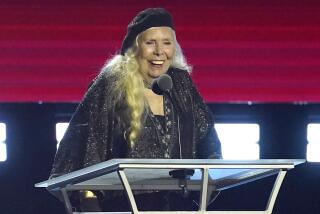Just Happy to Be Singing
- Share via
Jane Monheit in action is an attention-grabbing blend of sight and sound. Her lush, textured voice--astonishingly mature for an artist who won’t turn 24 until November--embraces familiar ballads with engaging sensitivity. And the elegance of her poised, onstage manner is countered by an undercurrent of sensuality triggered by a thick mane of long, curly black hair.
It’s a striking image--reminiscent of another era when beautifully gowned and coiffed jazz singers performed in Art Deco-style night spots. And it’s an image distinctly different from that of the most popular jazz vocalist of the past few years, Diana Krall, who has recently been resisting the glamour-girl tag that accompanied her rise. But comparisons between the two, despite more than a decade apart in age, are inevitable, for a variety of reasons.
Monheit is the most talked-about new arrival in the relatively rarefied world of jazz vocalizing since Krall surfaced nationally in the mid-’90s.
Although she was runner-up in the 1998 Thelonious Monk Institute Jazz Vocal Competition, the performance of Monheit’s first album, “Never Never Land,” was a surprise to everyone. Bursting out of the box last year without warning, and now well past 100,000 in sales, it has been surpassed over the past two years in the genre only by Krall’s megahit, the Grammy-winning “When I Look in Your Eyes.” Monheit’s second album, “Come Dream With Me,” also on the N-Coded Music label and scheduled for release Tuesday, has already shipped nearly 100,000 copies.
Seated in the dining room of a West Hollywood hotel recently, Monheit, as poised offstage as on, nonetheless seemed awe-struck at the level of response she has been receiving.
“Sometimes it’s hard for me to realize what’s actually happening,” she says. “Like, we were in Germany recently, and when we drove to the club where I was working, there was a line of people around the block waiting to get in.”
She shakes her head, a halo of hair swirling in all directions. “A line of people in Germany,” she continues, “waiting to see Jane Monheit from Oakdale, Long Island? That’s amazing.”
Both amazing and sudden. Monheit is only a couple of years out of college, yet her career is already in high gear, with an international itinerary of bookings scheduled well into 2002.
The fast pace is not surprising. It’s directly related to the presence of personal manager Mary Ann Topper--well known for her ability to spot gifted artists at an early stage. And the association is even more interesting considering the primary role Topper played in the emergence of Krall as an international jazz figure.
That association came to an end in June 1998 when Krall decided to link up with S.L. Feldman and Associates, a larger company based in her native Canada. The separation reportedly was not without bruised feelings.
“I’d rather not look at it quite that way,” says Topper, who also managed tenor saxophonist Joshua Redman in the breakout phase of his career. “The best way to put it is simply to say that there has been very little communication between us since the split.”
Topper signed Monheit in late 1999, after hearing her at the Monk competition. Monheit did not yet have a record contract and had been passed over by several major labels. She ended up signing with N-Coded Music, headed by Carl Griffin, who had signed Krall to her first deal when he was with Verve’s GRP label.
Comparisons with Krall became inevitable. They will undoubtedly be further heightened with Monheit’s new release. Included among the songs, in a program similar to the lineup of standards on her first album, is the Joni Mitchell number “A Case of You.”
Krall fans are well aware of her stunning performance last year of the same song in a televised tribute to Mitchell. Many saw the interpretation as a shift in Krall’s style, a step beyond the relatively pure jazz qualities that have dominated her recordings. Some will wonder about the song’s presence on an album by a singer handled by Krall’s ex-manager.
But Topper and the album’s producer, Joel Dorn, insist that they gave no thought to Krall’s rendering of the tune when the Monheit version was recorded.
“I first heard Jane do ‘A Case of You’ at her senior recital in May of 1999,” says Topper, “long before the Mitchell tribute or any Diana Krall singing of the song.”
Monheit, tendering her great admiration for Krall, explains that “A Case of You” is a song she’s loved since she first heard it as a child.
As much as the two camps may want to avoid comparisons, Terence Blanchard’s new “Let’s Get Lost” album--dedicated to the music of Jimmy McHugh--seems to fuel the fire. Featuring four guest vocalists--Monheit, Krall, Cassandra Wilson and Dianne Reeves--it opens with Krall singing “Let’s Get Lost” and immediately follows with Monheit’s reading of “Too Young To Go Steady.”
Topper explains that she never had any doubts about the value of Monheit’s participation in a project that included three other well-established vocal artists. “I was thrilled when I was told who else would be on the album,” she says. “These are the top of the line, a great opportunity for Jane to appear in that grouping, tremendous positioning for her and a chance to partake of the great repertoire of Jimmy McHugh songs.”
On “A Case of You,” Monheit’s rendering bears a far stronger resemblance to the Mitchell interpretation than to Krall’s highly personal, dark-toned rendering. And it highlights the fact that--despite the inevitable parallels and linkages with Krall--Monheit is a very different sort of singer.
It also suggests that she may be heading on a dissimilar career track. “I think she is sublimely talented,” says Dorn, a veteran who has also produced recordings by Jimmy Scott, Max Roach and Charles Mingus. “It happens that she came out of jazz, she loves jazz and can do it with the best of them right now, certainly among the current crop of jazz singers. But I think jazz is only one of the things she can do. She is not a jazz singer; she is a singer.”
With some reservations, Monheit agrees. Raised in a musical family with a mother, a grandmother and an aunt who were professional singers, a rock guitar-playing brother and a father who plays bluegrass guitar, she studied clarinet, piano and music theory while she was in high school and graduating with a bachelor’s degree from the Manhattan School of Music. Along the way, she countered her weekend jazz gigs with frequent performances in musical theater.
“There was a brief period in which I could have gone in a slightly different direction,” she says. “But it was always between jazz and musical theater, and I think I was always more serious about jazz. When I would go home and practice, it was always evenly split.”
Some of that ambivalence was present on her first album, and it continues on the new CD. Singing ballads such as “Over the Rainbow,” “Spring Can Really Hang You Up the Most” and “I’ll Be Seeing You,” her exquisite sound--crystal clear, penetratingly precise, filled with emotion--is front and center. Yet, aside from the superb jazz accompaniment from pianist Kenny Barron, with occasional solo counterpoint from horn men Tom Harrell and Michael Brecker, Monheit’s readings could be the product of a prime cabaret artist. Comparisons with Maureen McGovern, similarly gifted with extraordinary vocal attributes and a heartfelt feeling for jazz rhythms, come to mind.
But, just when one is prepared to embrace the warm sensitivity of Monheit’s singing without overstating its jazz attributes, she changes pace. She invests Antonio Carlos Jobim’s “Waters of March” with a distinct improvisatory edge, and offers another view of “I’m Through With Love” via a spirited duet with Barron.
On “Hit the Road to Dreamland,” set to a medium-tempoed, infectious groove, she climaxes a set of choruses with a closing passage in which she suddenly and effectively begins to scat, improvising in instrumental fashion. Then, shifting gears once again, she adds a distinctly pop-tinged revival of “If,” the soft pop hit of the early ‘70s by the band Bread.
Her view of a life already spent in music is showcased in a delightful juxtaposition of the first and last tracks. Opening with her luxurious version of “Over the Rainbow,” the CD closes with a brief segment, recorded when she was 3, singing--in a small, piping voice, but with unerring pitch--the first 16 bars of the same song, in the same key.
Dorn, who until he saw her perform live was initially reluctant to come on board as producer of the first Monheit recording, views the eclecticism of the music on the second album as a necessary passage for the young singer. Producer in the late ‘60s and early ‘70s of the initial hit albums by Roberta Flack and Bette Midler, Dorn describes “Dream With Me” as “chapter 2 of a trilogy.”
“Flack and Midler were both totally unknown when I worked with them,” says Dorn, “before their talents skyrocketed them to prominence. With Jane, I see this as a three-album move. The first album was a jazz program. On this second album, you can already begin to see a shift taking place. And just wait until the third!”
How does Monheit see herself? Do the genre labels have any real meaning for her? Does she think of herself as a jazz singer?
She smiles, her composure firmly in place, as she responds to a question she’s heard before and clearly expects to hear again.
“I really just think of myself as a singer,” she says. “From the time I was born, I’ve sung all different kinds of music--mostly jazz. In school it was like, ‘Oh, Jane, she’s the singing girl.’ That’s always been my identity, and I’ve always loved it. It never bothered me at all. I was always proud to be a singer, and I still am.”
Regardless of how she chooses to categorize herself, Monheit is certain about one thing.
“As long as I’m singing, as long as I’m singing with a good band and I’m singing good songs, I’m happy,” she says, relaxing a bit, as she seems to do when the conversation moves away from labels and career goals.
“I really think I would be happier singing Sunday brunches at a Holiday Inn, if I could do what I want to do, than I would be if I were rich and famous and having someone tell me what to sing. For me, it’s the music that matters.”
*
* Jane Monheit performs at Catalina Bar & Grill, 1640 N. Cahuenga, Hollywood, May 31-June 2 at 8:30 and 10:30 p.m., and June 3 at 7:30 and 9:30 p.m. Tickets: May 31, $18, June 1-3, $20. (323) 466-2210.
More to Read
The biggest entertainment stories
Get our big stories about Hollywood, film, television, music, arts, culture and more right in your inbox as soon as they publish.
You may occasionally receive promotional content from the Los Angeles Times.










